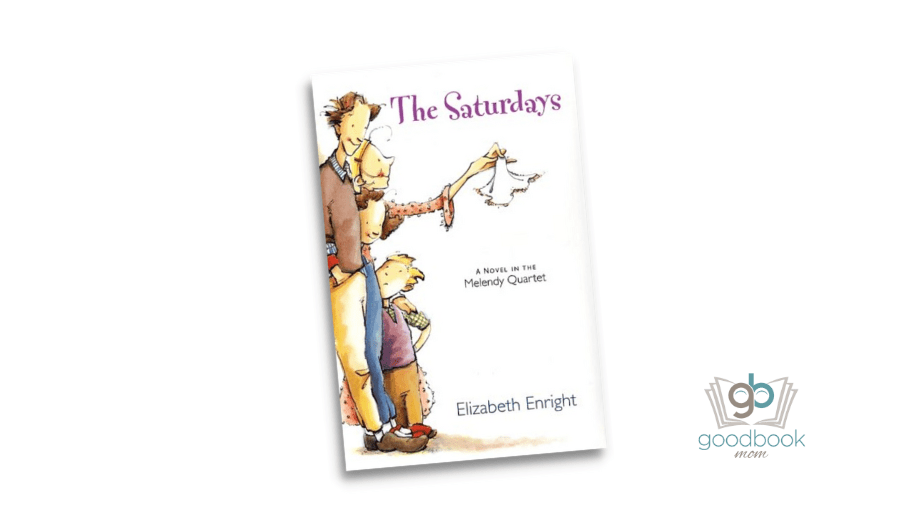
Summary
The Melendy children, Mona (13), Rush (12), Miranda or “Randy” (10), and Oliver (6), live in New York City during the 1940s. They decide to be creative with their weekly allowance and instead of spending it on themselves each week, they form a club and give all their allowance to a rotating child who can do whatever they choose that week. It’d dubbed The Independent Saturday Afternoon Adventure Club, or I.S.A.A.C. for short.
Each child has a memorable and often unexpected adventure on their designated week. Whether at a museum, the opera, the circus, or the salon, each child has a story to tell. The Melendys also face family hardships like suffering from coal gas poisoning and a housefire, as well as many sweet family moments together.
Reading Level: 9-12
Read Aloud Age: 6+
Mom Thoughts
This modern classic is sure to have your children captivated with adventures of living in New York City in the early 1940s. Written in 1941, the author accurately transports us to another time and place, while still staying within the bounds of reality. This makes it all the more magical because, in the eyes of children, it could happen. The characters are all developed thoughtfully and we grow to love each and every person- and animal- in the Melendy home.
The writing is fluid and descriptive and although it’s written in the third person, lovers of living books will surely be satisfied. Describing an experience at the opera, the text reads, “Above the voices of all the people in the place one could hear squeaks and scrapings, soft thumps, a toot of brass, a ripple of harp strings. Rush counted thirty-nine bald heads among the downstairs’ audience. He counted twenty-six brown fur coats on ladies in the boxes. Suddenly, the lights were dimmed, and a small man came into the orchestra pit. There was a deluge of applause, the little man turned and bowed impatiently, turned back to the musicians, raised his baton, and the music began. The world faded away and was replaced by a strange legendary land of gods and goddesses and heroic adventure.”
While there is a mention or two of sibling squabbling, the Melendy children care for and respect each other greatly. I appreciated how the author took care to have many positive, encouraging, and loving interactions between the siblings. Also, most of the poor decisions that the children make are addressed as such and not celebrated or encouraged.
Because this was written during a different time, there are a few things that might need to be addressed. Most notably, the children, except for Oliver, are allowed to venture out in New York City alone. This definitely appeals to a reader, because it sounds so adventurous and exciting to a young mind, but it might warrant a conversation depending on your child. I recommend this as a read-aloud so that you can address any of those differences as well as enjoy the lovely story together, but if you have a reader 10+ who isn’t a flight risk this, would be a fine independent read as well.
Although there are a few questionable things listed below and sprinkled throughout the text, especially in the section about the gypsies, the overall tone of the book is usually lighthearted, fun, and adventurous, with a few more serious moments displaying the love of a family. My children ages 5, 8, and 10 all greatly enjoyed this book as a read-aloud. The chapters are quite long, so do break them up, but overall I enjoyed this title!
Language: The word “Indian” is used in reference to Native Americans.
The words fat, dwarf, stupid, ugly, dumb, dope, idiot, and bird-brain are used in reference to people.
The phrases darn-it, darn, good Lord, I hate you, dang, and shut-up are used, although only once or so each.
Luck is referenced.
Someone is referred to as having “slanted eyes.”
The word “queer” is used with its proper context.
When taking a train, it is said, “…the Melendys saw brown-skinned children piling out of station wagons…”
Concerning not telling others about their club, one child says, “Swear on your sacred word of honor…”
In a panic, the father says, “What in the name of heaven…”
Questionable Behaviors: During a story recounting her childhood adventure, an older character runs away from home and visits the carnival. She pays money to have her fortune told but is then kidnapped by the fortunetellers who are gypsies. They beat her, whip her, and treat her very poorly. One of the gypsies “swears at horses” but the words are never used. This same character also drinks and becomes drunk.
SPOILER: Oliver, 6, sneaks out of the house to attend the circus alone. He is very sorrowful after and it’s clear the author isn’t advocating for this behavior, but it might warrant a conversation with a younger child.
Oliver “detests” a young girl who is being rude.
While feeling embarrassed for a choice she made, one of the children daydreams of running away and returning years later to a family begging for her forgiveness. She then snaps at the housekeeper to “go away.”
It is referenced that one time a child put Chinese firecrackers into the fireplace to see what would happen.
Other Things to Note: There is a string of “Mexican devil masks” in the children’s playroom.
The “Age of the Reptiles” is referenced.
One child recites the Witches’ Brew poem from Macbeth.
Randy draws pictures of sorceresses.
The Melendey have a Tang goddess statue in their home.
Oliver says a possible punishment for him is a spanking.
One child jokes about someone wishing to be “smaller around the middle.”
As this was written and set in the early 1940s, Nazis and Hitler are mentioned.
This post may contain affiliate links. Please read our disclaimer for more info.
Buy This Book
At A Glance
| Number of Pages | Chapters |
|---|---|
| 192 | 8 |

